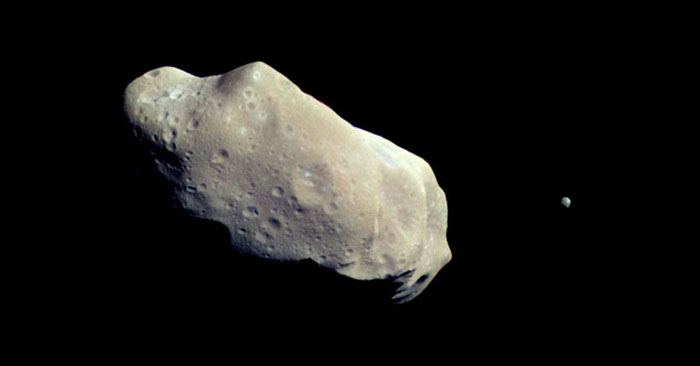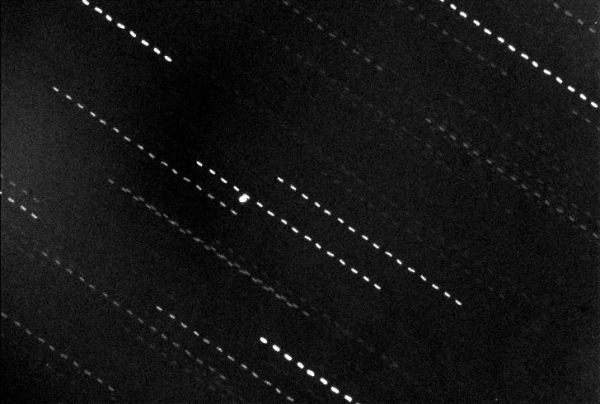The flyby will provide a unique opportunity for researchers to study a near-Earth object up close.
Asteroid 3122 Florence – Earth Flyby!
Tune in for a live free webcast! | 09/01/2017 19:00UTC
Movie: images from the live telescope session, of Asteroid 3122 Florence
Asteroid 3122 Florence (1981 ET3) will pass very close to Earth on Sept. 1.
Even at its closest, it will remain at a distance of about 4.4 million miles from Earth (~0.047 AU), at over 18 times the Earth-moon distance. It won’t come this close again until after the year 2500.
This space rock size is estimated in at least 2.7 miles (4.35 km) in diameter while its velocity at about 30,250 miles per hour (~48,700 km/h).
Asteroid 3122 Florence classified as Potentially Hazardous Asteroid, it is not considered to be at a collision course with Earth.
Movie: Initial images from the telescope, of Asteroid 3122 Florence
The flyby will provide a unique opportunity for researchers to study a near-Earth object up close.
The Bareket observatory in Israel will offer a special Live view of the close approach, using a remote Telescope accessible via the Internet.
The webcast take place at: 09/01/2017 at 19:00UTC, for a duration of about 3 hours.
CLICK HERE FOR A TIME COUNTER - ADAPTED TO YOUR CITY
* The website automatically refresh the latest image, during the event.

Emerald™ digital planetariums Live-observatory-planetarium connection users
are encouraged to tune in their planetariums to the live event
About the Live event
Since the data load from the incoming images is so extent, our system limits itself to refreshing about every 25 to 45 seconds.
This means the image will appear static, then reset itself automatically.
If you watch for a period of perhaps 3 minutes or so, you will notice appreciable movement against the background stars
See an example for this relative motion at our Comet P1 webcast, Asteroid 1998 QE2 flyby and Asteroid 2012 DA14 webcasts.
Movie: archive footage from the C2009 P1 GARRADD COMET LIVE WEBCAST
The Telescope tracking is set on the Asteroid itself, so it will appear to stay in place – while the background stars will move each time it refreshes.
There can also be unforeseen glitches, (such as viewer overload) so please be patient! You don’t have to click anywhere else – when the broadcast is happening it will be right here...
Image: Asteroid Ida. Credit - NASA,JPL
Further information
1. Watch Comet P1 Garradd after session movie from the Bareket observatory & Universe today
This was a 6 hour live feed of the comet, opened a window to the universe for teachers, students and the general public. During the event more than 400 long exposure images was captured. The Internet telescope pinpointed the comet's core with extreme accuracy.
2. Live NASA Deep space voyage - by the Bareket observatory remote Internet Telescope Using a sophisticated Robotic Internet accessible Telescope and a super sensitive cooled CCD camera, special musical image sonifications for those who are blind and an expert astronomer who will provide live explanations - every one will have the ability to enjoy from his/her special private journey through space-time.
The public was encourage to submit their "ask the astronomer" questions, via a dedicated online form, before or during the live event. The event was broadcasted Live at NASA website as well as at the Bareket observatory's web site. There were total of 2 Independent webcasts, each one took about 1.5 hours in duration.
3. Asteroid 3D modeling by high school students & "Asteroid discoveries by high-school students" (Hebrew): monitoring and search for asteroids and near Earth objects, by high school students
4. Outreach Astronomy activities - with emphasize on promoting science and peace in the middle east
Educators & Astronomy science centers
may also be interested in projecting the live feed on their
Planetarium dome using a Digital planetarium projector
Suggested Show
'Voyage into the deep space' | Bareket observatory's Internet Telescope & NASA
{vimeo width="640" height="480"}37853871{/vimeo}



